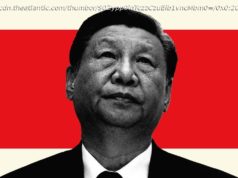There’s no need to ruin a prosperous partnership.
A financial adviser I know, Frank Astorino, says nothing destroys wealth like divorce. That’s a warning China and the U. S. should keep in mind as they intensify their trade war. If they continue down the road they’re on, an economic separation between the world’s two largest economies is a very real possibility. And the costs would likely exceed any marital spat in history.
Sure, there’s always a chance that Donald Trump and Xi Jinping could renew their friendship and hash out a deal. But if they follow through on their threats — which they so far have — practically all products traded between the two countries would face punitive tariffs. Meanwhile, Washington is finalizing tighter restrictions on foreign investment, obviously aimed at blocking Chinese firms from U. S. acquisitions.
Add in China’s existing barriers to foreign business, which could well increase amid the dispute, and what you get is something that was unthinkable only a few months ago: China and the U. S. could dissolve the bonds of trade and investment that have made them highly intertwined and interdependent for so many years. The world hasn’t seen a divorce of such global consequence since Henry VIII.
Some might say the marriage was an unhappy one to begin with. Many Americans see China as an unreliable partner who cheats and steals. And many Chinese policymakers — who have lately embarked on a grand quest to replace foreign products and technology with local substitutes — think close ties with the U. S. have outlived their usefulness. But both countries will undoubtedly find that breaking up is hard to do. Open access to the U. S. market has been a cornerstone of China’s growth since the 1980s. It’s true that China’s domestic market is now so large that exports are less critical, but the U. S. economy is still $7 trillion larger than China’s — a difference equivalent to the national output of Brazil, France and India combined. No ambitious Chinese company could claim to be truly global without a U. S. presence. That’s why Chinese automaker Zhejiang Geely Holding Group Co. recently opened a Volvo factory in South Carolina, even though it has ample opportunities to sell sedans at home.
A good chunk of what China exports to the U. S. is assembled locally, with the purpose of shipping finished products (such as iPhones) to American consumers. Restricted access to the U. S. would force Chinese and foreign companies to reorder their supply chains in a host of sectors, from electronics to clothing to toys, dealing a serious blow to Chinese manufacturing. It would also dent China’s hopes of becoming a global hub for cutting-edge products. Without competitive access to the American market, at least some of the capacity that could’ve been built in China would have to be located elsewhere.
The costs would be high for the U. S., too. Homi Kharas of the Brookings Institution projects that by 2030, China will account for 22 percent of global consumer spending by the middle class, compared to just 7 percent for the U. S. Those new Chinese shoppers might be lost to European, Japanese or local brands if U. S. companies face stiffer barriers to doing business in China than they already do.
The U. S. could also forfeit investment. As China’s major companies expand globally, they’ll become far bigger investors overseas (much as Japanese firms did in the 1980s). Facing a hostile environment in the U. S., Chinese businesses would likely direct that capital elsewhere. According to the American Enterprise Institute, Chinese investment in the U. S. plunged by half in 2017 from the year before; AEI scholar Derek Scissors blames a combination of a state-driven reduction of certain Chinese outbound spending and tougher scrutiny of Chinese deals by the U. S.
The biggest danger of a U. S.-China split, however, might not be economic. Arguably, one reason China’s rise has so far been generally peaceful is that its economy is so integrated with the world’s preeminent military, political and economic power. If those ties wither, outright conflict could become more likely.
Of course, any separation may not be final. Starbucks Corp. is probably in China to stay. But over the past four decades, the two countries have built a life together that has brought untold benefits to consumers, households and shareholders. Recklessly spiralling toward divorce puts all that at risk. Recovering the lost wealth could take a lifetime.
To contact the author of this story: Michael Schuman at contactschuman@gmail.com
To contact the editor responsible for this story: Timothy Lavin at tlavin1@bloomberg.net






